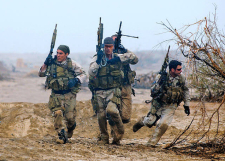As the campaign against the Islamic State (ISIS) ramps up, the U.S. Air Force has admitted that it is running out of bombs to drop on ISIS targets as the 15-month bombing campaign in Syria has depleted munitions supplies.
"We are now expending munitions faster than we can replenish them," Air Force chief of staff Gen. Mark Welsh said in a statement.
"We've dropped 20,000 bombs and missiles on ISIS since the war began 15 months ago and the supplies are not being replenished at a fast enough rate,'' he stressed.
Welsh called for additional funds and other support for the "long fight,'' stressing "today's war demands the right equipment and capability to achieve desired effects.''
"B-1s have dropped bombs in record numbers. F-15Es are in the fight because they are able to employ a wide range of weapons and do so with great flexibility. We need the funding in place to ensure we're prepared for the long fight. This is a critical need,'' Welsh said.
Another air force official said the bombing campaign has left the U.S. Air Force munitions depot stocks "below our desired objective."
The official told CNN that the Air Force has requested additional funding for Hellfire missiles and is developing plans to ramp up weapons production to replenish its stocks more quickly.
But he said replenishing the stock can take "up to four years from time of expenditure to asset resupply.''
The Air Force's publication of the number of missiles and bombs dropped came amid continued criticism from Republicans—in particular those running for president—who insist the Obama administration has been too timid in the fight against ISIS.
Many on the right are also calling for the U.S. to loosen the rules of engagement and lead a more aggressive fight against the militant group, said CNN.
American pilots fired their jets' weapons in less than half of the nearly 18,000 sorties they made in the first 10 months of 2015, according the latest figures available.
That's up from 2014, when pilots fired their weapons just one-third of the time, CNN reported.
















